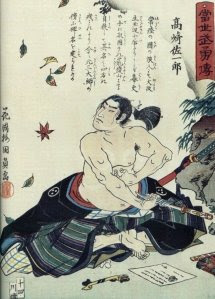 I debated about writing on this topic for a while but it has been part of my stay in japan and something I intimately experienced.
I debated about writing on this topic for a while but it has been part of my stay in japan and something I intimately experienced.At the mid year conference a man had jumped from the third floor in my hotel and my friend and I had found him after exiting the elevator. I am not certain if he died (though I searched the newspapers and watched the news) but the amount of blood and lack of any movement would suggest he did. It shocked me how many of the Japanese people who walked by took a quick look and then hurried along their way as though it was an everyday occurrence and this man's life wasn't noteworthy.
Suicide is view much differently in Japan than in the west. I think this view probably began with the tradition of seppuku or as the west likes to call it harikari.
http://en.wikipedia.org/wiki/Seppuku
Seppuku (切腹?, "stomach-cutting") is a form of Japanese ritual suicide by disembowelment. Seppuku was originally reserved only for samurai. Part of the samurai honor code, seppuku was used voluntarily by samurai to die with honor rather than fall into the hands of their enemies, as a form of capital punishment for samurai who have committed serious offenses, and for reasons that shamed them. Seppuku is performed by plunging a sword into the abdomen and moving the sword left to right in a slicing motion. The practice of committing seppukuat the death of one's master, known as oibara (追腹 or 追い腹, ) or tsuifuku (追腹, ), follows a similar ritual.
This form of suicide is seen as noble and many of those who committed this act are revered to this day. I admit to admiring the stories of the
Fourty-Seven Ronin
http://en.wikipedia.org/wiki/Forty-seven_Ronin
The story tells of a group of samurai who were left leaderless (became ronin) after their daimyo (feudal lord) was forced to commit seppuku for assaulting a court official named Kira Yoshinaka. The ronin avenged their master's honor after patiently waiting and planning for over a year to kill Kira. In turn, the ronin were themselves forced to commit seppuku — as they had known they would be — for committing the crime of murder.
or the Byakkotai
http://en.wikipedia.org/wiki/Byakkotai
Twenty of the members of the Byakkotai, cut off from the rest of their unit in the wake of the Battle of Tonoguchihara, retreated to Iimori Hill, which overlooked the castle town. From there, they saw what they thought was the castle on fire, and committed seppuku (with one failed attempt) in desperation, believing their lord and families dead. However these 20 Byakkotai members were mistaken in their assessment of defeat, as the castle defenses had not actually been breached; the castle town surrounding the inner citadel was aflame. As the majority of the town was between Iimori Hill and the castle, the boys saw the rising smoke and assumed that the castle itself had fallen.
Japan has one of the highest suicide rates in the world but the suicides in Japan are not typically committed by people who are depressed and want out of life but people who have cause mistakes or are so stressed they are willing to take their lives before being a disgrace. Many ninth grade students are known to take their lives before or after their high school entrance examinations and as such their classrooms are on the second floor of the school rather than the third. Within a month you will hear of several cases of CEOs or people in positions of power committing suicide because their companies have not performed well, they were caught in scandal, or some sort of mistake was made that had public repercussions.
Though I don't want to get into an anthropological discussion here many scholar say that Japan is known as a shame culture and shame and ostracisim rather than guilt is the process that controls their lives. I haven't done a study into this topic but it does seem to fit with the reasoning for many suicides.
I can't help but wonder for what reason did that man die?





1 comment:
Wow, that would have truly been a shock to see - hope you girls are okay!
Interesting about their attitude toward suicide, though I've come across that in other cultures as well - (pre-Christianity). There's an interesting wiki on it as well: http://en.wikipedia.org/wiki/History_of_suicide
It seems that Christianity really was against it, which would probably be why Western culture frowns on it so immensely (and in some cases, rightly so, but as you say, this could become a huge discussion)...
Anyway, interesting posts, as always. :)
Your ski mountain ranges are beautiful (even though I'm tired of looking at snow, the trees were quite stunning - kinda like the 'hoar frost' of the prairies? :) )
Post a Comment